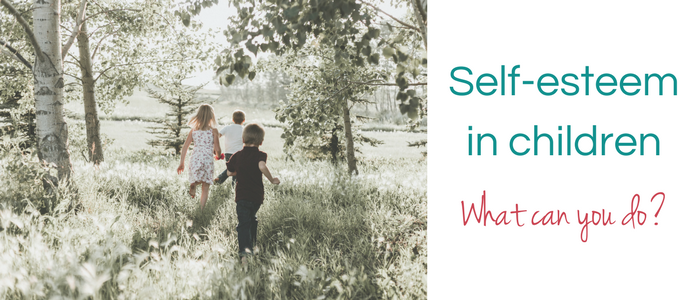Self-esteem in children
Self-esteem is how you think and feel about yourself. This may be primarily positive or negative, or it may move between the two points. Your self-esteem usually dictates how you live your life, the decisions you make, and how you view others.

According to mental health charity YoungMinds, 75% of young people have experienced low self-esteem at least once. And they’re not alone. 80% of British women admit they put too much pressure on themselves to ‘be perfect’, despite accomplishing an average of 26 tasks a day.
What causes low self-esteem?
Low self-esteem can be caused by a number of things – comparing yourself to friends and those around you, problems with family or in your relationships, or problems at school, at work or with your health. Sometimes these feelings will pass on their own but other times, more steps are needed to help yourself feel better.
With the rise of social media – most commonly used by children and young people – it’s much easier to get an insight into another person’s life. While as adults, we know that the likes of Instagram and Facebook act as a highlight reel, children may not see it that way. They may compare themselves to those they follow, believing they need to look or act a certain way to be happy.

75% of 12-15 year olds and 25% of eight to 11 year olds have a profile on social media.
While there are certain factors and experiences that may affect our self-esteem, we will all have a general feeling about our value and self-worth. Children are no different.
If your child is experiencing low self-esteem, this may be reflected in how they act and behave. You may notice a change in their body language, approach to life or overall behaviour.
Signs of low self-esteem
If you’re worried that your child or teenager is maybe having problems with their self-esteem, know that there are steps you can take to help them feel better.
Working to improve self-esteem takes time. It requires courage and honesty, and so, support is important. As a parent or guardian though, you’re not alone. Children’s mental health services are in place to help you along the way, and private counselling is also available.
In 2016 Childline saw a 9% increase in counselling sessions for children with low self-esteem.
Learn more about counselling for children.
Common signs of low self-esteem in children include:
- They constantly put themselves down.
- They doubt their success so don’t try as hard.
- They fear change or are afraid to try new things.
- They compare themselves to others.
- They think they are inadequate or unimportant.
- They lose their temper easily.
How can you help?
Our esteem begins to develop from birth, and building self-esteem in children is an ongoing process. Being a parent is an incredibly hard job and we don’t always get it right, but as long as you remember to praise and listen to your child, and enforce boundaries in a positive way, then your child should know that you are always there for them – your love and support is constant.
You can help build your child’s self-esteem by praising them when they’ve done something. It may be the smallest thing, but tell them how well they’ve done and that you’re proud of them. Children need to feel cared for. They may not always be ready to talk about how they feel, but they need to know that you are there to listen and support, without judgement.
What can parents do to improve self-esteem, in themselves and in children?
We spoke to Sarah Kendrick, Head of Service at children’s mental health charity Place2Be, who offers her tips and advice for building self-esteem not just in your children, but in yourself too.
Can you think of three positive things to say about a close friend? What about three positive things about yourself? If you struggled with the second question, you’re not alone.
It is sometimes difficult to think of positive things about ourselves and to be balanced and fair when we look at who and how we are as people. From our work in schools, we know that this is something children and young people can struggle with too. It can be all too easy nowadays to compare ourselves negatively to others, especially online, and sadly low self-esteem affects more than eight in 10 of the pupils who have access to our school-based support.
Understanding that we are all unique, with our own strengths, qualities and interests as well as challenges is hugely important for our well-being and can help us to build self-esteem. We also know that through having a balanced view of ourselves, we can feel better equipped to cope with life’s difficulties and make better connections with others.
That’s why this Children’s Mental Health Week (5th to 11th Feb), our theme is ‘Being Ourselves’ and we’re encouraging children, young people and adults to celebrate what makes them unique.
 There are lots of small things you can do to feel more comfortable in your own skin. Start by looking out for negative self-talk. When you notice that you’re being very critical of yourself, try challenging the thought with something positive. While something may not have gone exactly the way you wished it would, it’s important you don’t let it discount all the positive things!
There are lots of small things you can do to feel more comfortable in your own skin. Start by looking out for negative self-talk. When you notice that you’re being very critical of yourself, try challenging the thought with something positive. While something may not have gone exactly the way you wished it would, it’s important you don’t let it discount all the positive things!
Be mindful of the comparisons you make with yourself and other people. Just because someone else appears happy on social media or even in person, doesn’t mean you are necessarily seeing the whole picture. Comparisons with other people can lead to a bad habit of negative self-talk, contributing to poor mental health.
Setting yourself small challenges is another great way to help you feel better about yourself. Whether you start running again, sign up for a new course or learn to cook something new, be proud of what you have achieved. Remember that you don’t have to do it all on your own and if you feel like you are struggling with your self-esteem, the mental health charity Mind has a helpline which provides information on a range of topics related to mental health.
As adults, we play a really important role in helping the children in our lives to develop a balanced view of themselves. We can help them to appreciate and celebrate their attributes in a number of ways. Try pointing out their positive qualities. It could be that they show real determination, courage or kindness – showing you have noticed this will help them to recognise that we all have different things that make us who we are. Don’t forget that you can acknowledge their challenges too – accepting that our struggles are also a part of who we are is important.
Try asking children to tell you three things that they like about themselves. If they struggle, offer some examples. It might be that they are kind and help their friends, they like to make people laugh or maybe that they keep trying, even if they find something difficult.
Have a chat about your different strengths, qualities and interests as a family. Whether it’s over dinner or in the car, it can be fun to notice how we are all different from each other and you never know, you might also learn something new about yourself! Celebrating your own efforts with your children will also help them to recognise theirs. No matter how big or small, sharing your achievements will help them to understand that we don’t always have to be the best at something to be proud of it.
Want to know more? Sarah also spoke to Happiful Kids on how children can improve their self-esteem.

Find a therapist dealing with Young people's counselling
All therapists are verified professionals





